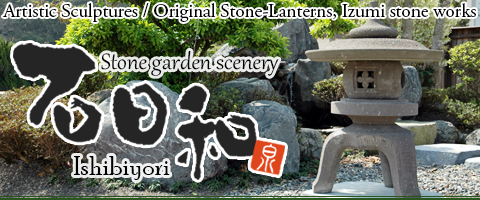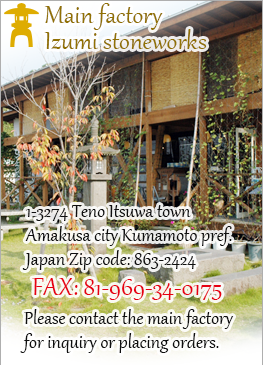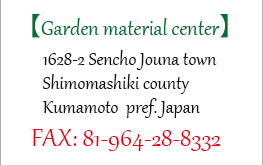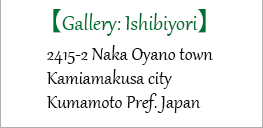Zenigata Mizubachi
Category
A saying 吾唯足知 “ware tada taru wo shiru" which means “I simply know what is enough” is imprinted on this lantern. Comes in 3 different diameters from 30cm ~45cm.
※Product’s color may look different depending on your monitor.
※Shipping may be delayed due to changing order volume
| Title | Lantern made of Amakusa tuff【Zenigata Mizubachi】 |
|---|---|
| Specifications | Diameter: 30cm (13.8”) / 39cm (15.4”) / 45cm (17.7”) |
| Color | Sunny【Gray】/Rainy【Black】 Amakusa stone lanterns change their color to black when they get rained on and go back to their original color gradually as they dry. You’ll be amazed to see the mysterious change in color of those lanterns. |
| Gallery | We exhibit our stone lanterns and gravestones at Ishibiyori. Free entrance. |
Explanation of each part of the lanterns

【 ① Houju 】
‘Houju’ is an onion-shaped part that is on top of the final piece. The shape is thought to have come from either an onion-shaped roof or a lotus flower and is the same as what decorates the top of rectangular or other stone towers.
【 ② Kasa 】
‘Kasa’ meaning umbrella, is like a roof above the ‘Hibukuro’, and it comes in various shapes such as square, hexagonal, octagonal, etc., depending on the components. Some Maru Yukimi Lanterns come with circular-shaped ‘Kasa’ as well.
【 ③ Hibukuro 】
Where the light stays is the most important part of the lantern. A real flame will not be lit in a lantern with decorative purposes; however, if practical use is required fire or electrical lighting may be used.
【 ④ Chuudai 】
‘Chuudai’ is a platform that supports the ‘Hibukuro’ with a shape that contrasts with the foundation. This part may be added for decoration such as “Renben” or “Kozama”.
【 ⑤ Ashi / Dai 】
In the natural ‘Yukimi’ stone garden, it is called ‘ashi’ but it is also called ‘dai’ when used in wooden lanterns.








 information
information
 TOP
TOP





